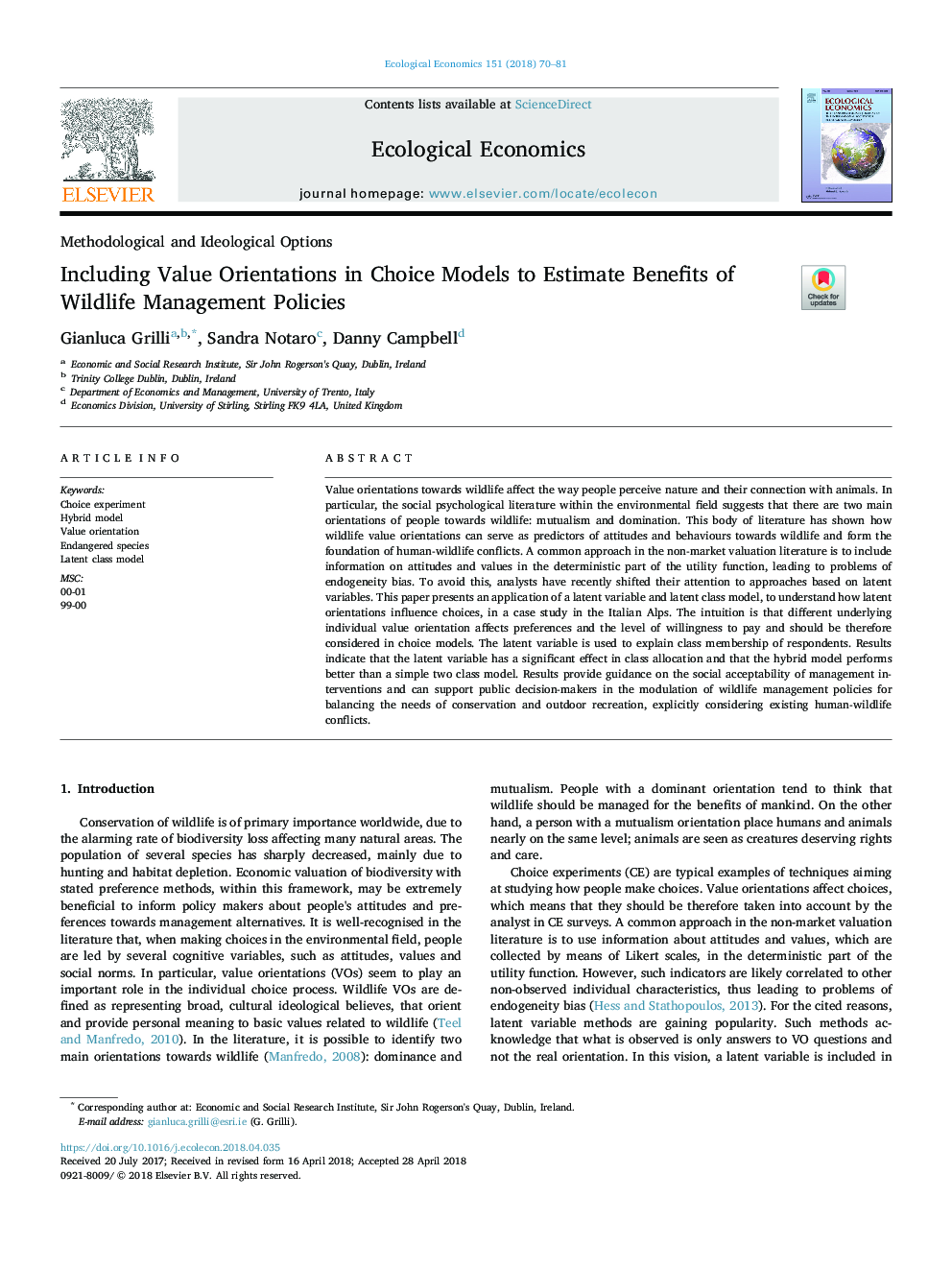| کد مقاله | کد نشریه | سال انتشار | مقاله انگلیسی | نسخه تمام متن |
|---|---|---|---|---|
| 7343954 | 1476328 | 2018 | 12 صفحه PDF | دانلود رایگان |
عنوان انگلیسی مقاله ISI
Including Value Orientations in Choice Models to Estimate Benefits of Wildlife Management Policies
ترجمه فارسی عنوان
از جمله گرایشات ارزش در مدل های انتخابی برای برآورد مزایای سیاست های مدیریت حیات وحش
دانلود مقاله + سفارش ترجمه
دانلود مقاله ISI انگلیسی
رایگان برای ایرانیان
کلمات کلیدی
آزمایش انتخاب مدل ترکیبی جهت گیری ارزش، گونه های در معرض خطر، مدل کلاس خاموش 00-01، 99-00،
ترجمه چکیده
جهت گیری ارزش نسبت به حیات وحش به نحوی که افراد طبیعت و ارتباط آنها با حیوانات را درک می کنند، تأثیر می گذارند. به طور خاص، ادبیات روانشناسی اجتماعی در زمینه محیط زیست، نشان می دهد که دو جهت اصلی مردم به حیات وحش وجود دارد: متقابل و سلطه. این ادبیات نشان داده است که چگونه جهت گیری های ارزش های حیات وحش می تواند به عنوان پیش بینی کننده نگرش ها و رفتارهای حیوانی و حیات وحش منجر شود و پایه و اساس مناقشات انسان و حیات وحش را تشکیل دهد. یک رویکرد رایج در ادبیات ارزیابی غیر بازار، شامل اطلاعات مربوط به نگرش ها و ارزش ها در بخش قطعی عملکرد سود است که منجر به مشکالت تعصب اندوژنیک می شود. برای جلوگیری از این، تحلیلگران اخیرا توجه خود را به رویکردهای مبتنی بر متغیرهای پنهان شده تغییر داده اند. در این مقاله یک کاربرد یک متغیر غیرواقعی و مدل کلاس پنهان ارائه شده برای درک اینکه چگونه جهت گیری های پنهان بر انتخاب ها تاثیر می گذارند، در یک مطالعه موردی در کوه های آلپ ایتالیا. شهود این است که گرایش متفاوت ارزش های فردی متفاوت بر ترجیحات و میزان تمایل به پرداخت تاثیر می گذارد و بنابراین باید در مدل های انتخابی مورد توجه قرار گیرد. متغیر پنهان برای توضیح عضویت در کلاس پاسخ دهندگان استفاده می شود. نتایج نشان می دهد که متغیر پنهان در تخصیص کلاس به طور قابل توجهی تاثیر می گذارد و مدل هیبریدی بهتر از مدل دو کلاس ساده عمل می کند. نتایج ارائه راهنمایی در مورد پذیرش اجتماعی مدیریت مداخلات و می تواند از تصمیم گیرندگان عمومی در مدولاسیون سیاست های مدیریت حیات وحش برای متعادل سازی نیازهای حفاظت و تفریحات در فضای باز، به صراحت با در نظر گرفتن درگیری های حیوانی و زندگی در دسترس است.
موضوعات مرتبط
علوم زیستی و بیوفناوری
علوم کشاورزی و بیولوژیک
بوم شناسی، تکامل، رفتار و سامانه شناسی
چکیده انگلیسی
Value orientations towards wildlife affect the way people perceive nature and their connection with animals. In particular, the social psychological literature within the environmental field suggests that there are two main orientations of people towards wildlife: mutualism and domination. This body of literature has shown how wildlife value orientations can serve as predictors of attitudes and behaviours towards wildlife and form the foundation of human-wildlife conflicts. A common approach in the non-market valuation literature is to include information on attitudes and values in the deterministic part of the utility function, leading to problems of endogeneity bias. To avoid this, analysts have recently shifted their attention to approaches based on latent variables. This paper presents an application of a latent variable and latent class model, to understand how latent orientations influence choices, in a case study in the Italian Alps. The intuition is that different underlying individual value orientation affects preferences and the level of willingness to pay and should be therefore considered in choice models. The latent variable is used to explain class membership of respondents. Results indicate that the latent variable has a significant effect in class allocation and that the hybrid model performs better than a simple two class model. Results provide guidance on the social acceptability of management interventions and can support public decision-makers in the modulation of wildlife management policies for balancing the needs of conservation and outdoor recreation, explicitly considering existing human-wildlife conflicts.
ناشر
Database: Elsevier - ScienceDirect (ساینس دایرکت)
Journal: Ecological Economics - Volume 151, September 2018, Pages 70-81
Journal: Ecological Economics - Volume 151, September 2018, Pages 70-81
نویسندگان
Gianluca Grilli, Sandra Notaro, Danny Campbell,
